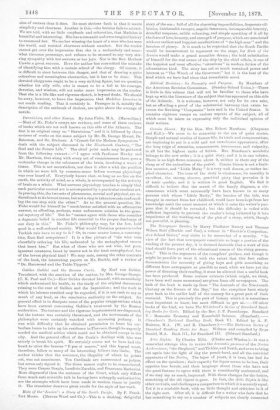Galileo Galilei and the Roman Curia. By Karl von Gobler.
Translated, with the sanction of the author, by Mrs. George Sturge. (C. K. Paul and Co.)—Herr Gebler devoted himself, with an assiduity 'which undermined his health, to the study of the original documents -relating to the case of Galileo and the Inquisition ; and the work in -which his labours resulted may be regarded, if it is not rash to Bay so much of any book, as the conclusive authority on the subject. Its general effect is to dissipate some of the popular exaggerations which have been current concerning Galileo's treatment by the Roman authorities. The torture and the rigorous imprisonment are disproved, but the torture was certainly threatened, and the movements of the philosopher were certainly watched with unceasing jealousy. It was with difficulty that he obtained permission to leave his eur- sburban house to take up his residence in Florence, though be urgently -needed the medical advice which could not be obtained except in the city. And the general effect of the Curia's dealings with him was utterly to break his spirit. Ho certainly seems not to have had the beart to utter the famous "E pur si mnovo," and this legend must, therefore, follow so many of its interesting fellows into limbo. The Author thinks that the sentence, the illegality of which he points out, was not unanimous. Ton Cardinals are enumerated as judges, 'but seven only signed it. The three names ought to be remembered. 'They were Caspar Borgia, Laudivio Zacchia, and Francesco Barberini. More disgraceful than the sentence of the Court, which only differs from much anti-scientific talk in having been unhappily authoritative, are the attempts which have boon made in modern times to justify it. The translator deserves great credit for the style of her work.


































 Previous page
Previous page